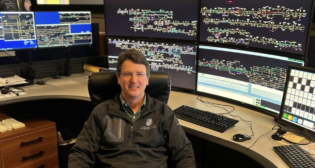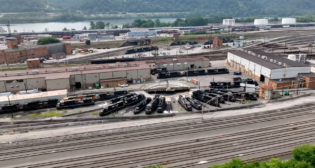
Transit Briefs: MBTA, CTA, BART, Amtrak, MDOT, RTD
Written by Carolina Worrell, Senior Editor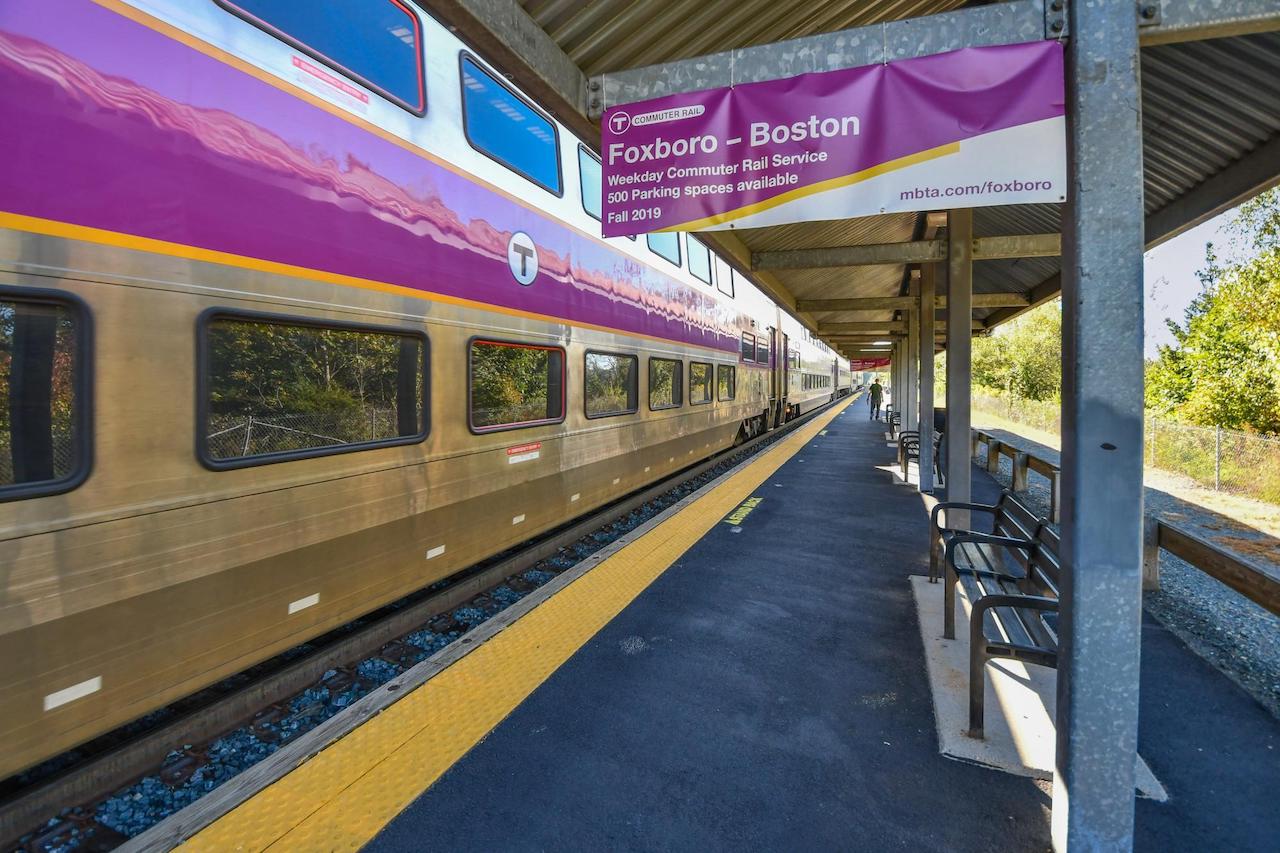
On Sept. 12, 2022, the MBTA will launch a new, year-long pilot to test interest in weekday Commuter Rail service to Foxboro.
The Massachusetts Bay Transportation Authority’s (MBTA) Foxboro Weekday Commuter Rail Service Pilot is scheduled to begin Sept. 12. Also, the Chicago Transit Authority (CTA) signs contract for new K-9 teams to be deployed across rail system; Bay Area Rapid Transit (BART) commemorates its 50th anniversary with vintage arcade games; Amtrak breaks ground on two Americans with Disabilities (ADA) station upgrade projects and celebrates the completion of another; Massachusetts Gov. Charlie Baker, U.S. Rep. Richard Neal and head of Amtrak take train tour to see what needs to be done to bring Springfield’s rail lines back; Maryland Department of Transportation (MDOT) Maryland Transit Administration (MTA) will ramp up activities on the Purple Line project; and the Regional Transportation District (RTD) selects Dr. Joel Fitzgerald Sr. as Chief of Police and Emergency Management.
MBTA
On Monday, Sept. 12, a one-year weekday Commuter Rail service pilot between South Station and Foxboro Station will start, allowing riders to travel easily and directly between Boston and Foxboro, the MBTA announced on Aug. 24. In spring 2020, the MBTA cancelled its Foxboro Weekday Service Pilot, which began Oct. 21, 2019, due to the COVID-19 pandemic. The one-year pilot program consists of 21 weekday trips—11 inbound and 10 outbound—between Foxboro and Boston via the Franklin Commuter Rail line. Free parking is available at Foxboro provided by The Kraft Group.
“We’re excited to again launch this weekday service pilot between Foxboro and South Station, providing access to transit for more Commuter Rail riders,” said MBTA General Manager Steve Poftak. “We appreciate the collaboration with The Kraft Group, including in offering free parking at the station for the duration of the pilot. We continue to be committed to improving public transit across all the communities we serve, and we look forward to analyzing the pilot’s data upon completion of the pilot.”
A full list of trains to and from Foxboro Station can be found at mbta.com/Foxboro. Foxboro station is in Zone 4 with a regular Zone 4 one-way fare costing $8.75, a regular Zone 4 round-trip fare costing $17.50, and a regular Zone 4 monthly pass of $281 on CharlieTicket or $271 on the mTicket app.
Trains between Foxboro and South Station travel on the Franklin Commuter Rail line. Not all trains will stop at Hyde Park, Ruggles or Back Bay stations.
CTA
If you want to commit a crime on the CTA, you’re barking up the wrong tree. CTA announced on Aug. 24 that it has entered into a new agreement for unarmed, K-9 teams to patrol stations across its rail system. Each K-9 team, CTA says, will consist of two, unarmed guards and a canine. This new contract is the latest initiative announced by the CTA since the unveiling of its “Meeting the Moment” action plan and “supports the guiding pillar to enhance safety and security of customers and employees.”
CTA’s “Meeting the Moment: Transforming CTA’s Post-Pandemic Future” action plan was formally unveiled less than two weeks ago and outlines a multi-pronged approach to improving rider experiences to ensure that public transportation is the first choice of travel throughout the region,” the Authority says.
CTA has signed an 18-month contract—paid for with funds from the annual operating budget—with Action K-9 for $30.9 million, which will provide up to 100 unarmed guards and 50 canines per day, plus supervision and supporting equipment. These new K-9 units, CTA says, will complement the efforts of the existing security presence out on CTA, which now boasts more than 300 unarmed guards throughout the system each day. Although it has contracted with Action K-9 for security support in the past, CTA says this new contract will “allow each K-9 team to better handle a variety of situations by doubling the number of security guards with each canine.”
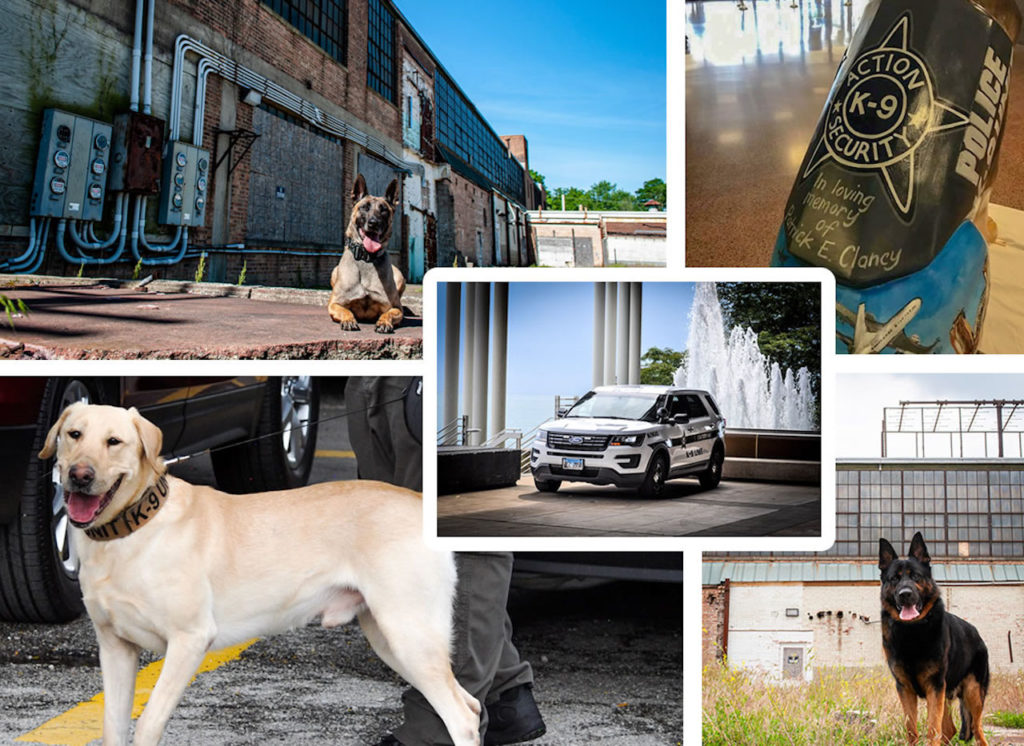
“As part of ‘Meeting the Moment,’ we promised we would be increasing security to ensure customers’ peace of mind when choosing to take the CTA” said CTA President Dorval R. Carter Jr. “The addition of the K-9 units is just one way we’re following through on our commitment to security for our customers, as well as our frontline employees who play a vital role in keeping our system moving every day.”
According to CTA, details regarding timing and general deployment plans of the new K-9 teams are still being finalized and will be announced later. CTA says it is working with Action K-9 to ensure that all guards assigned to K-9 teams have a valid canine handler license and have undergone all required training prior to their deployment on CTA properties.
Also, part of the “Meeting the Moment” action plan, CTA says, is “the development of new ways to target theft and prevent fare evasion before it leads to other illicit activities.” Among their duties, these unarmed K-9 teams will be deployed near station turnstiles to deter fare evasion and increase the overall security presence at stations, the Authority adds.
BART
From Saturday, Sept. 3 through Friday, Sept. 9, 2022, BART will commemorate it’s 50th anniversary by throwing it back to the 1970s with a free, vintage arcade game event at Powell St. Station in downtown San Francisco.
BART will have four vintage arcade games (Pac-Man, Asteroids, Space Invaders and Galaga) set up for free play each day of the event between 9 a.m. and 5 p.m.

This event, BART says, specifically throws back to 1976 when the agency partnered with Atari to place a six-game, six-sided console on the platform level to promote the gaming company’s new games and bring revenue to BART through the 25-cent per play cost.
Amtrak
Local leaders in Macomb, Ill., and Amtrak officials on Aug. 24 celebrated the completion of a $2.7 million ADA station improvement with a ribbon-cutting ceremony. Additionally, Amtrak recently broke ground on a $11.5 million ADA station improvement in Burlington, Iowa, and on a $13.8 million ADA station improvement in Ottumwa, Iowa.
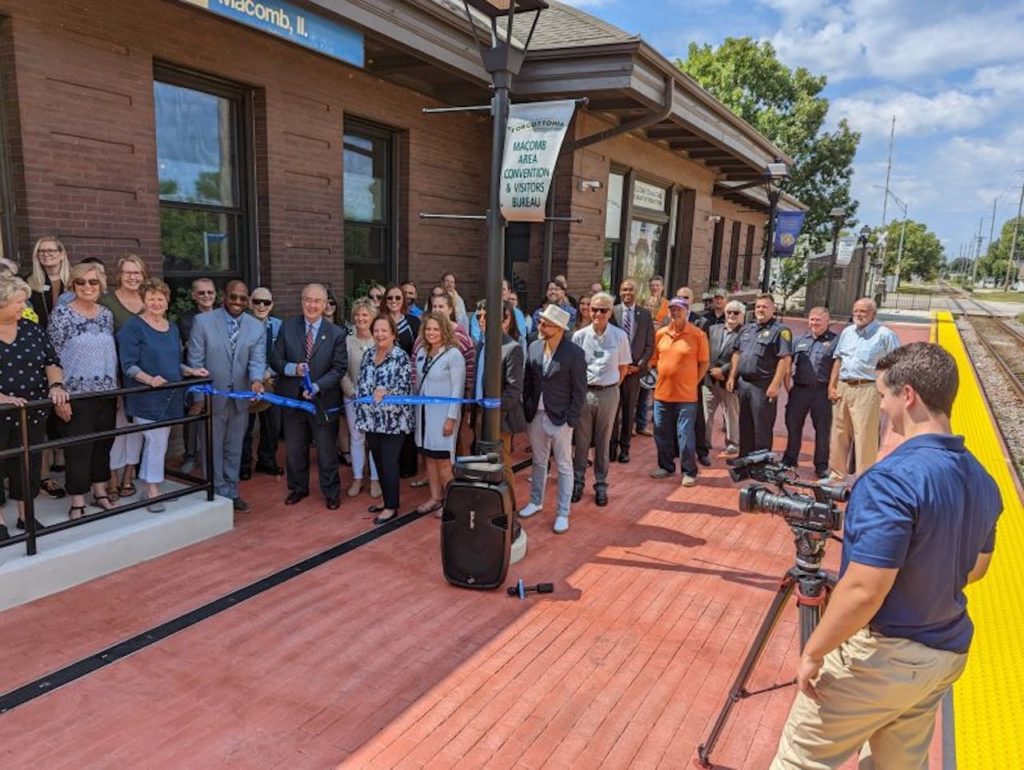
Macomb Station was constructed in 1913 by the Chicago, Burlington and Quincy Railroad (now BNSF Railway) and is a contributing property within the Macomb Courthouse Square Historic District. According to Amtrak, the ADA improvements include a new 300-foot-long boarding platform, with a central area comprised of brick pattern-stamped concrete surface and an embedded hydronic snowmelt tubing system, connected to existing manifolds and a new boiler in the basement level of the station building. The platform includes a detectable warning surface, guardrails, trench drain, LED lighting, signage, and a mobile lift enclosure. A new ramp with landing is provided at each of the station exterior doors facing the platform. New accessible walkways connect the platform with the sidewalk at E. Calhoun Street and N. Randolph Street.
Exterior improvements on Burlington Station, which was erected in 1944 by the Chicago, Burlington and Quincy Railroad, include two new 700-foot-long boarding platforms with rehabilitated canopies and structure, new station signage, mobile lift enclosures, energy efficient LED lighting, and guardrails. According to Amtrak, new accessible pathways will provide improved connections from the existing station building to the platform and the various access points on the site.
Exterior improvements on Ottumwa Station, which was dedicated in 1951 by the Chicago, Burlington and Quincy Railroad, include two new 1,200-foot-long boarding platforms with the rehabilitation of the existing canopy and structure, new station signage, a mobile lift enclosure, energy efficient LED lighting, and guardrails. According to Amtrak, new accessible pathways provide improved connections from the existing station building to the platform and the various access points on the site. There is also a project to improve the interior of the station building with ADA compliant restrooms and ticket counter. The two entrances to the station will be upgraded with power operated doors and an ADA compliant path to existing parking spaces and city streets.
According to Amtrak spokesman Marc Magliari, these investments total $28 million, with much of the work done by local subcontractors. Magliari adds that two large projects, one in Texas and one in Mississippi, are expected to be completed mid-late September.
To date, Amtrak says it has completed 172 ADA station-related projects as part of the ADA Stations Program, including 20 additional stations meeting ADA compliance last fiscal year for $82 million. According to the passenger rail service, another 29 stations are targeted for completion this fiscal year at a forecasted investment of $113 million. The program is also advancing 120 station designs and 40 station construction projects as part of its ongoing commitment to providing accessibility for all customers. Since 2011, Amtrak says it has invested more than $554 million in accessibility upgrades throughout the country.
Restoring Springfield’s Rail Lines
Separately, on Aug. 22, Massachusetts Gov. Charlie Baker, Massachusetts Transportation Secretary James Tesler, U.S. Rep. Richard E. Neal (D-Springfield) and Amtrak CEO Stephen Gardner took a two-hour, mile-by-mile train tour in a special Amtrak observation car added to the westbound run of the Lake Shore Limited from Boston’s South Station to Union Station in Springfield, Mass., to see what work needs to be done to bring connections on Springfield’s rail lines, once the “crossroad of New England,” back, Mass Live reported on Aug. 23.
According to the Mass Live report, Gardner “expressed optimism pointing to the state’s efforts—and to cooperation from New York and Connecticut—as well as to federal funding he expects to be available early in 2023.” According to the report, Gardner also placed Springfield’s plans “in the larger picture of a passenger-rail revival” with $66 billion for Amtrak coming from the 2021 Bipartisan Infrastructure Bill that Neal, as Chairman of the House Ways & Means Committee helped to pass. Massachusetts is set to get $9 billion from the bill.
Gardner added that Amtrak is considering continuing some trains, which terminate in Springfield, to Boston in the east as a “step toward improved service while working toward the larger goal of commuter-level service,” Mass Live reported, adding that the state has asked Amtrak to add two new trains on the Boston-Springfield-Albany service, stopping in Pittsfield, Mass.
But to add even that level of service, Mass Lives reported, the state and CSX, which owns the east-west tracks Amtrak uses through Springfield, must add double tracks, station platforms and other improvements. CSX is “pledged to cooperate with passenger improvements as a condition of its merger earlier this year with Pan Am Railways,” Mass Lives reported.
Gov. Baker, who leaves office at the end of December says he plans to get Massachusetts’s applications for rail grants under the bill ready and submitted by the end of his term, Mass Lives reported. Democratic candidate for governor Maura Healey, now the Attorney General, said she wants an east-west rail director focused on the issue.
Neal said he’s discussed the issue with Healey and that her plans work with what he and Baker are doing.
According to the Mass Lives report, Neal “cajoled a once-reluctant Baker into supporting east-west rail over a period of years,” which culminated in April when Baker and Neal called for a Western Massachusetts passenger rail authority that “would apply for federal funds and eventually administer expanded east-west commuter rail.”
According to the Mass Lives report, state lawmakers didn’t create the authority, but they passed a $275 million bond authorization for the project, which goes along with a $50 million bond authorization passed in 2020, as well as the federal money.
The legislature, according to the Mass Lives report, appointed a commission in the waning days of its session to “shape the authority, with instructions to flesh out details of the authority by March 2023, after a new governor has taken office.”
Amtrak, Mass Lives reported, has long targeted the Boston-Springfield-Albany route—now served by just one train a day, the Lake Shore Limited overnight to Chicago—as an opportunity for expansion.
New York Gov. Kathy Hochul supports plans to add two additional Amtrak trains on the Boston-Springfield-Albany run, stopping also in Pittsfield, according to the Mass Lives report.
In July, the state formally told U.S Department of Transportation (USDOT) officials the state would like to develop the Boston-Albany corridor and the Boston-Springfield-New York City route via Hartford and New Haven, Conn., according to the Mass Lives report.
MDOT MTA Purple Line Project
After dominating the headlines for a long period of time due to trouble, RT&S reports that Maryland’s Purple Line light rail project is ready to change the landscape.
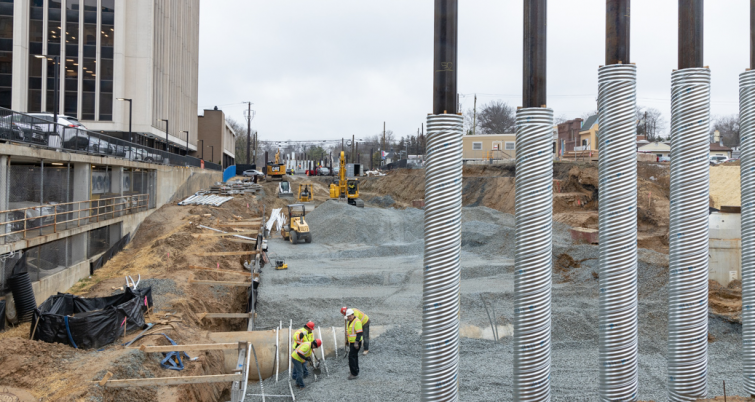
The project, RT&S reports, is expected to kick into high gear shortly after Labor Day. Over the last few months inspections and prep work have been ongoing, but major construction activity is expected to start in the coming weeks. Laborers’ International Union of North America Local 11 recently signed a collective bargaining agreement with Maryland Transit Solutions, which is the new contractor for Purple Line work. That’s good news considering the history of the project. The previous contractor walked off the job due to contractual issues, and the hope is the new agreement will avoid any labor stoppages.
The Purple Line is four years behind schedule and millions of dollars over budget. The finish line is now Fall 2026. More money also has been added, $1 billion, and the Maryland Department of Transportation said total cost sits at $3.4 billion.
The Purple Line will be 16.2 miles with 21 stations and will connect the Bethesda Metro Station to the New Carrollton Metro Station.
RTD
RTD has appointed Dr. Joel Fitzgerald Sr. as the agency’s next Chief of Police and Emergency Management, a role that “carries primary responsibility for customer safety and security across the eight counties and 40 cities of the Denver Metro region in which RTD operates.” He succeeds Robert (Bob) Grado, who stepped down from the role in March, and Deputy Chief Steve Martingano, who served as Interim Chief during the intervening time.
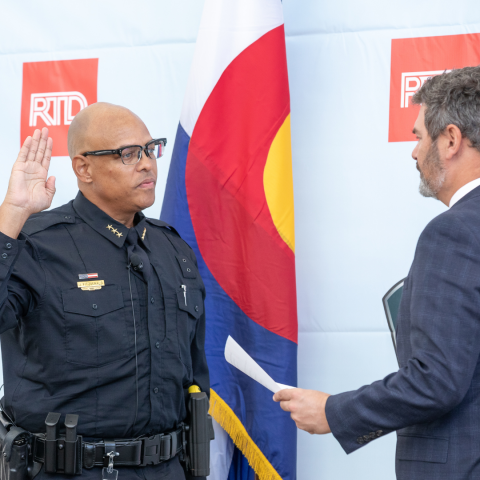
According to RTD, Fitzgerald’s three decades of law enforcement experience include serving as Police Chief in four U.S. cities. He was sworn into his new position on Aug. 23 at a ceremonial event at Denver Union Station that featured remarks by RTD General Manager and CEO Debra A. Johnson and Board Chair and District J Director Vince Buzek. The new Chief of Police and Emergency Management was selected following a nationwide search.
While his municipal law enforcement experience strengthened partnerships with transit agencies in other cities, leading a transit police agency is something he had not yet achieved in his career as a police chief, Fitzgerald said. The opportunity to lead a division that serves so many people and plans to grow appealed to him. Customers must feel safe and secure while riding the RTD system, he said.
“I am a person of integrity, and I care about the people we serve,” Fitzgerald said. “I set expectations high for interactions with people. It is important to be someone who beats crime and builds legitimacy and trust in the community.”
Fitzgerald was born in Philadelphia and earned a bachelor’s degree in liberal arts from Villanova University, a master’s in business administration from Eastern University and a Ph.D. in business administration from Northcentral University. He began his career in policing in 1992 with the Philadelphia Police Department and served in various ranks over 17 years. In 2009, Fitzgerald was selected as Chief of Police in Missouri City, Texas, a suburb of Houston. He was Chief of Police in Allentown, Pennsylvania, from 2013 through 2015, and Chief of Police in Fort Worth, Texas, from 2015 through 2019. Fitzgerald joined the Philadelphia Sheriff’s Office as Chief Deputy in January 2020 and was most recently appointed Chief of Police in Waterloo, Iowa, in May 2020.
According to RTD, in each of the four positions where he served as Police Chief, Fitzgerald’s selection was the result of a competitive national search, and each of the appointments made him the first African American to serve in that rank in the history of each organization. As a result, General Manager and CEO Johnson noted, his career “reflects a commitment to integrity, conceptual leadership that promotes procedural justice and evidence-based strategies to abate crime.”
“Joel is a courageous leader,” Johnson added. “He builds coalitions, he is focused on strategic planning, and he has expanded community policing everywhere he has served – all elements that are important to RTD. He is committed to the betterment of the community in his approach.”
Fitzgerald has been a member of professional associations that include the Major Cities Chiefs Association, the National Organization of Black Law Enforcement Executives, the Police Executive Research Forum (PERF), the National Association for the Advancement of Colored People, and the International Association of Chiefs of Police. He is a graduate of Harvard University’s Senior Executives in State and Local Government program, the FBI National Executive Institute, Northwestern University’s School of Police Staff & Command, and PERF’s Senior Management in Policing program.
In 2019, Fitzgerald became an elected member of the Federal Bureau of Investigation Law Enforcement Executive Development Association Board, for which he now serves as Second Vice President.
RTD’s Transit Police division encompasses the chief of police, one deputy chief, one administrative lieutenant, four sergeants and a team of transit police officers. The division is supported by two 911 dispatch centers, a video investigation unit and more than 600 contracted police and uniformed security officers. Its jurisdiction spans RTD’s service district of nearly 2,400 square miles. Its annual operating budget is $28 million.
To learn more about Fitzgerald and RTD’s Transit Police division, visit the Transit Police webpage.

